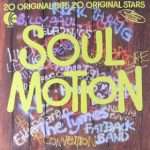The album was bought on my sixteenth birthday, Saturday, 16th October 1976. It was at the end of a week at home in Somerset, a week away from the austere regime of our Dartmoor boarding school. To have bought on album on a Saturday out of school would hardly have been possible, we were allowed fifty pence a week in pocket money and albums cost at least £3, a sum far larger in real terms than the cost of similar recordings now.
Birthday money allowed the purchase of two albums and a silver bracelet for the then girlfriend. The Beach Boys album, a classic hits collection in a pale blue sleeve has long since disappeared; the other is here, and it is still playable. ‘Soul Motion’ it was called; it was one of those K-Tel compilations (didn’t K-Tel market all sorts of products?).
Billy Paul’s ‘Me and Mrs Jones’ was the most memorable of the tracks in the compilation, not because the music was particularly striking, but because to the ears of a sixteen year old it possessed a touch of the risqué.
A decade later, parish ministry was to bring me face to face with the damage caused by the ‘Mrs Joneses’ of the world, the heartbreak faced by deserted wives and children because husbands had decided that marriage vows were optional and that Mrs Jones offered a more attractive future. (The pain of the Mr Joneses, abandoned by their wives, must have been just as severe, but perhaps they never talked about it).
Years passed without hearing the song then two weeks ago a spell of airport shopping at Heathrow included the purchase of a triple CD album called ‘Soul City’. Listening to the seventy odd tracks while driving the roads of Laois and Offaly brought a renewal of acquaintance with Mrs Jones and her cafeteria assignations. It seemed an odd song, was it a celebration of infidelity?
Listening to RTE radio this evening, a song that had been out of sight for at least twenty years again made an appearance. ‘Billy Paul and Mrs Jones’, commented John Creedon, avoiding any first person references.
There was a realisation for the first time of how sad was the song. The relationship with Mrs Jones extended no further than furtively holding hands under the café table; the lyric speaks of being unable to afford to build up their hopes. The song has no sense of the risqué, rather it is just odd. Two people in a relationship going nowhere because their other relationship had gone nowhere. It’s not even about love, it’s just a thing going on.
Perhaps it doesn’t do to analyse songs; I used to like Billy Paul.
